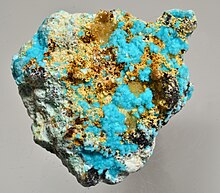Grandview Mine | |
 Grandview/Last Chance Mine, circa 1900 | |
| Location | Grand Canyon National Park, Grand Canyon, Arizona |
|---|---|
| Coordinates | 36°1′5″N 111°58′32″W / 36.01806°N 111.97556°W |
| Built | 1892 |
| NRHP reference No. | 74000347 |
| Added to NRHP | July 09, 1974 [1] |
The Grandview Mine, also known as the Last Chance Mine, was operated by Pete Berry from 1892 until 1901 in what later became Grand Canyon National Park. The Grandview Mine Historic District includes what remains of the mine workings and machinery as well as the ruins of a stone house and sleeping shanty. Physical evidence, including low stone walls and construction debris, suggests that several wood structures were also originally present on the site.
Pete Berry established Last Chance Mine on Horseshoe Mesa in 1892. He constructed the four-mile Grandview Trail down to the copper mine, and in 1893 began hauling ore out by mule. Although the ore was over 70% pure copper and won a prize at the Columbian Exposition in Chicago, the mine did not prove profitable, and in 1901 Berry and his partners sold it to the Canyon Copper Company, who operated it until 1907. [2] The mine was then acquired by William Randolph Hearst, who sold it to the National Park Service in 1940. [3]
The mineralization at the mine is secondary copper minerals in a breccia zone along a monocline flexure in the Redwall Limestone, which is bleached, brecciated and marbleized below the overlying Supai Group. Grandview is the type locality for grandviewite, a copper aluminium silicate. [4] [5] Grandview produced exceptionally fine mineral specimens of cyanotrichite, brochantite, chalcoalumite, and many other copper and uranium minerals. These specimens are now rare, as mineral collecting is not permitted in the National Park. [4]
In 2009, the mines were gated to protect bat roosts, support on-going bat research, preserve historic mine resources, and promote visitor safety. The gating project was done by Mine Gates, Inc., with support from Grand Canyon National Park, Bat Conservational International, and Freeport-McMoRan. Details of the mine site, as well as manufacturing and installation of each bat gate are documented on the MineGates site. [6]


References
- ^ "National Register Information System". National Register of Historic Places. National Park Service. April 15, 2008.
- ^ "Grandview Mine". List of Classified Structures. National Park Service. November 25, 2008. Archived from the original on May 21, 2011. Retrieved November 26, 2008.
- ^ Holland, Jr., F. Ross (August 31, 1972). National Register of Historic Places Inventory-Nomination: Last Chance Mine (pdf). National Park Service.
- ^ a b Grandview Mine data at Mindat.org
- ^ "Grandviewite: Grandviewite mineral information and data". www.mindat.org. Retrieved May 23, 2016.
- ^ "Grandview and Last Chance Mines, Grand Canyon National Park". MineGates Inc. Retrieved May 23, 2016.
External links
- Bat roosts
- Industrial buildings and structures on the National Register of Historic Places in Arizona
- Geography of Coconino County, Arizona
- Grand Canyon
- Copper mines in Arizona
- History of Coconino County, Arizona
- Buildings and structures in Coconino County, Arizona
- 1892 establishments in Arizona Territory
- Historic districts on the National Register of Historic Places in Arizona
- National Register of Historic Places in Coconino County, Arizona
- National Register of Historic Places in Grand Canyon National Park

